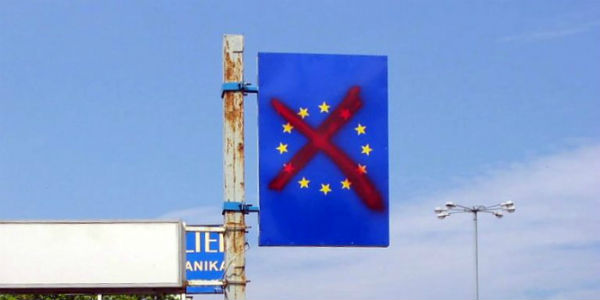Euroscepticism is here to stay
Isolationism, nationalism and protectionism are back on the political scene with a vengeance in established democracies. In Europe, a growing number of citizens and elites are willing to take considerable economic and political risk to protect what they perceive as vital national interests. This means that Euroscepticism is here to stay, writes Catherine E. De Vries.

Picture: Tomasz Sienicki, via Wikimedia Commons/Public Domain
Political and economic cooperation across borders is experiencing growing levels of popular resistance. The outcome of Brexit vote, the election of Donald Trump, and the electoral success of nationalist forces across the globe seem indicative of a growing backlash against international cooperation. While many thought the process of more international cooperation to be irreversible, in part because it was expected to lead to a universal acceptance of liberal and capitalist values, isolationism, nationalism and protectionism are back on the political scene with a vengeance. While Donald Trump’s slogan to ‘Make America Great Again’ is at the heart of his campaign and current administration, Nigel Farage’s mantra of ‘taking back control’ dominated the Brexit campaign. Although we should not overestimate the extent to which current developments represent a ‘real’ break from the past, arguably identification with the nation-state and national interest have always been important aspects of the political belief systems of citizens and elites alike, something seems to be have changed. A growing number of citizens and elites are willing to take considerable economic and political risk to protect what they perceive as vital national interests (may it be societal cohesion, national control, borders, trade, etc.).
These developments seem especially apparent within the European Union. Decades of cooperation and integration have created a profound interconnectedness between the political, economic, and social fates of member states. Yet, at the same time, the fortunes of member states have diverged dramatically. The Eurozone crisis has unmasked deep structural imbalances within the Union, especially between Northern and Southern Euro members. These differences existed before the onset of the crisis, but have deepened further as a result of it. The outcome of the Brexit referendum in Great Britain provided a first glimpse of what may lie ahead when Eurosceptic sentiment hardens.
My new book Euroscepticism and the Future of European Integration shows that these developments have has left an important mark on public opinion. Euroscepticism once believed a peripheral development has become a mainstream phenomenon. It is no longer tied to small segments of society, extremist political parties or to specific economic cycles. Brussels’ elites often grapple to come grips with it, and seem to lull themselves into the belief that is a temporary post-crisis blip that will disappear when conditions improve. The wealth of evidence I collected for the book suggests that this take on things could not be farther from the truth. Euroscepticism has become a permanent feature of the European project.
Euroscepticism is best understood in relative terms rather than as absolute. It develops in close communication with people’s evaluations of how well their nation state is doing. Is there a viable alternative to EU membership? Will my country to do better on its own? Euroscepticism is a comparison of the benefits of the current status quo of membership and those associated with an alternative state, for example one’s country being outside the EU. Much of the Brexit campaign was about the alternative state: when the UK leaves the EU, £350 million per week can go to the NHS, or each UK household will be £4,300 worse off. Why did support in the remaining 27 member states increase after Brexit? The economic and political uncertainty surrounding Brexit makes the status quo look better and the alternative state look worse. Well at least for now.
One of the key findings of my book is that Euroscepticism is higher in countries that do better than the EU average in terms of economic performance and quality of government, and among those that think their country is doing better than much of the EU. Why is that? It is to a large part due to the fact that they attribute the good economic and political performance to the quality of their national government, not to the EU. Because their country is doing relatively well, or at least they perceive it as such, they think a viable exit option to membership exists.
This points to an important paradox in the European integration process: the fruits of further economic and political cooperation have over time become the factors that allow populations or individuals to turn against the European project in the first place. Why? This is because these benefits are primarily attributed to the national governments and actions, not to the EU. This suggests that better performance is not going to be the silver bullet to combat Euroscepticism. Pro-European elites in Brussels and beyond need to live with Eurosceptics.
European integration, like increasing international cooperation and interdependence across the globe, is an inherently contested phenomenon due to the fact that its economic, political, social and cultural features inherently bring about tensions. Dani Rodrik has eloquently argued that globalisation represents a ‘trillema’ for societies, as they cannot be globally integrated, completely sovereign and democratically responsive all at the same time. These tensions equally apply to the process of European integration. The conflict over Europe today and in the coming decades will be about how these trade-offs are made and defended.
This article represents the views of the author and not those of Democratic Audit. It first appeared on LSE Brexit.
About the author
 Catherine E. De Vries is Professor of Politics at the University of Essex and Westdijk Chair in Political Behaviour in Europe at the Free University Amsterdam (@CatherineDVries).
Catherine E. De Vries is Professor of Politics at the University of Essex and Westdijk Chair in Political Behaviour in Europe at the Free University Amsterdam (@CatherineDVries).





 Democratic Audit's core funding is provided by the Joseph Rowntree Charitable Trust. Additional funding is provided by the London School of Economics.
Democratic Audit's core funding is provided by the Joseph Rowntree Charitable Trust. Additional funding is provided by the London School of Economics.
There is surely a further and interesting point – much unthinking comment in the UK has centred on the entirely inaccurate idea that the young are ‘bound’ to be europhile and the old eurosceptic and that things will therefore change as the oldies die out. Until a few years before the referendum, the under 25s in the UK were the second most anti-EU group (after the 65+), and if you look at two very different EU countries – Hungary and France – anti-EU sentiment is highest among the young voters. When some young voters here suggested that ‘tomorrow belongs to them’ and that selfish older voters are taking them out of the EU, it was instructive to note that on the basis of that logic, ‘selfish oldies denied the young their choice of Le Pen’ in the French presidential election with something like half of the young voting for her. Similarly for support for the EU, in France it is high among the over 60s and often negative among the under 25s. Hungary is off the scale with the young splenetically anti-EU.
I look forward to reading your book, but take issue with the use three times in the first three sentences of the concept that people are rejecting ‘co-operation’ (eg you refer to a ‘growing backlash against international cooperation’). This is really like nailing an emotive colour to a mast and strikes a jarring note (eg like myself a former vice-chair of UKIP saying that people had voted for ‘continued occupation’ had the vote gone the other way).
People are not rejecting co-operation but are uneasy at the emergence of structures that smack of the opposite of it – ask the people of Greece about the ‘do as you’re told or we’ll destroy you’ style of ‘co-operation’ within the EU framework (another country where the young talk all the time about German occupation, not co-operation). In fact what voters seem to want (as seen by the weekly polling on Brexit and its subtexts) IS in fact precisely co-operation – but not orders submitted from on high via bodies whose democratic values appear to be greatly lacking and for whom ‘cooperation’ means blind submission to orders and Directives and the project of building the European empire.